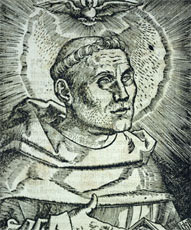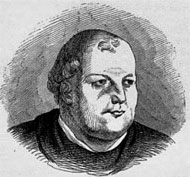


Luther letters excerpts from:
Luther's Works, Volume 48, Letters I
Krodel, Gottried G. and Lehmann, Helmut T. , Eds.
Published by Fortress Press, Philadelphia, 1963

This letter is Martin Luther’s report on his meeting with von Miltitz, who tried to get Luther to issue an apology to the Pope.
Greetings. My Spalatin, Sir Karl Miltitz and I have met at Lichtenberg. We agreed—and as I understand from him, this has great possibilities—that I should publish a letter in German and in Latin, addressed to the Pope, as a preface to some brief writing. In this letter I am to relate my whole story and show that I never wanted to attack the Pope personally, and throw the whole blame on Eck.
As all this is true, I can easily do it, and I will offer, as humbly as I can, to keep silent, provided that others keep silent too, so that I may not seem to omit anything in my power to make peace. This is my desire, and, as you know, I have always been ready to do it. I shall prepare this, therefore, at the earliest possible moment. If it turns out the way we hope, it is well; if it turns out differently, it will also be well, because this is then the will of the Lord.
Farewell.
From Lichtenberg, [in the house of the] Antonians, October 12, 1520
Martin Luther

Luther thanks Duke John Frederick for supporting his case and tells of his determination to continue his public activities in spite of the bull "Exsurge Domine."
Serene, Noble Sovereign, Gracious Lord: Before all else, my humble prayer and all my services are always at Your Grace’s disposal. Gracious Lord, I have received Your Grace’s letter, and read it with great joy. Your Grace’s constant concern in this cause, so as to write so assiduously to my Most Gracious Lord, Duke Frederick, elector, etc., stirs up great hope in me that God will help his gospel through Your Grace.
As the bull has in no way frightened me, I intend to preach, lecture, and write in spite of it. I suspect, however, that the people of Leipzig, if they could, would drive me out of Wittenberg, with the help of Duke George and the Bishop of Merseburg, who have developed toward me a hatred defying description. But I have commended all this to the divine will. I well realize that they try to destroy not me but rather Your Grace’s small university at Wittenberg. They have played with this thought for some time, and now they rejoice that they have found a "just" reason. May they do whatever God has destined them to do. I shall await the next throw of the dice.
With this, I want humbly to commend myself—but before all else, the cause of the Christian truth—to Your Grace. May God bless, strengthen, and govern you for us, according to his divine will. To him be praise and honor. Amen.
Wittenberg, October 30, 1520
Your Grace's dedicated priest
D. Martin Luther
Augustinian

Lazarus Spengler was disturbed by rumors of a possible split in the Wittenberg Faculty, as well as between Luther and Erasmus. Luther assures him that everything is fine. Luther also comments on a second edition of his appeal to a General Council and on the bull "Exsurge Domine."
Honorable and wise sir, my dear lord and friend: I have read your letter with special joy and seen your great courage in the matter of Christian truth. God strengthen you and all of us with his grace. I also appreciate very much the great and kind concern that you show on behalf of me and all the people of Wittenberg. You certainly should believe, however, that Doctor Karlstadt and Philip agree entirely. Occasionally, of course, in the University one person says something differently than another; this fact, perhaps, gave rise to this rumor. But Master Philip is, by God’s grace, so gifted that he will not have any controversy with Karlstadt. Likewise, it never occurred to me to bear a grudge against Erasmus or to dislike him. It is all right with me that he does not want me to make any references to him. I also answered him and promised not to mention him in this way any more, nor any other good friends, since it is dangerous for them. People imagine and write many such things about me; therefore don’t be disturbed by their gossip. God willing, Erasmus and I will of course remain one. It is true, however, that once in a while I debate privately with Philip on how close Erasmus is to the [right] way or how far he is from it. He and everyone else may also do that about me with impunity and in friendship. I will not attack anyone first. It is sufficient for me to defend myself if attacked.
I have now arranged for a second printing of my Appeal in Latin and in German, although I thought there was no real need for it, since the bull was so open and shameless in condemning me in a totally anti-Christian manner. We do not know whether the bishops will put the bull into effect. I do not regard myself as having legally received the bull.
With this I commend myself to you before God. Amen.
Wittenberg, November 17, 1520
D. Martin Luther
Augustinian

Luther reports on the burning of certain papal books.
Greetings. On December 10, 1520, at nine o'clock in the morning, all the following papal books were burned in Wittenberg at the eastern gate near the Church of the Holy Cross: the Decretum, the Decretals, the [Liber] Sextus, the Clementines, the Extra-vagantes, and the most recent bull of Leo X; likewise the Summa Angelica, Eck's Chrysopassus and other books by this author, writings of Emser, and certain other books that were added by different people. This was done so that the incendiary papists may see that it doesn’t take much to burn books they cannot refute. This is the news here.
Farewell.
Wittenberg, December 10, 1520
Martin Luther

Luther expresses his willingness to appear before the Diet of Worms if summoned, regardless of any danger which might be involved. In addition he mentions some matters relating to his correspondence and his rebuttal of the bull.
Greetings. Today I received the copies of the letters from Allstedt as well as your letter from Kindelbrück. In it you ask me what I would do if called by Emperor Charles and if [I could do anything] without endangering the gospel and the public welfare, since you see that [my] enemies do everything to bring this affair to a head.
Of course I would by all means come, if called, in so far as it would be up to me, even if I could not come by my own power and instead would have to be driven there as a sick man. For it would not be right to doubt that I am called by the Lord if the Emperor summons. Further, if they should employ force in this matter, which is most probable [for they do not want me called there because they want to learn something], then this matter can only be commended to the Lord. For He who saved the three men in the furnace of the Babylonian king still lives and rules. If He does not want to preserve me, then my head is of slight importance compared with Christ, who was put to death in greatest ignominy—a stumbling block to all, and the ruin of many. No one’s danger, no one’s safety can be considered here. We must rather take care that we do not expose the gospel [which we have finally begun to promote] to the derision of the godless and thus give our enemies a reason for boasting over us because we do not dare confess what we have taught and are afraid to shed our blood for it. May the merciful Christ prevent such cowardice on our part and such boasting on their part. Amen.
Of course it has to come about that the kings and rulers of the earth would gather and rage with the nations and peoples against God and his Christ. Yet the Spirit teaches in that same Psalm that those who trust in God will be blessed; and not only this, but also that the Lord will laugh and deride those who don’t. Certainly it is not up to us to decide whether my life, or for that matter my death, will bring greater or less danger for the gospel and the public welfare. You know that God’s truth is a rock of stumbling set for the fall and rising again of many in Israel.
The only concern remaining to us is to pray to the Lord that Charles’s reign would not stain its first actions with my blood—or anyone else’s—to protect ungodliness. I would rather perish [as I have often said] by the hands of the Romanists alone, than that he and his administration should be involved in this affair.
You may expect everything of me except flight and recanting. I do not want to escape, much less recant; may the Lord Jesus strengthen me in this. I could do neither without endangering piety and the salvation of many.
I return the copies of the letters; in due time I shall send a letter to the Sovereign, as you have outlined in the draft. Until now I thought that all my [writings] reached this court at the earliest moment via other people. So now take whatever is off the press, for the German edition, based on the Latin, is now being printed.
Farewell and be strong in the Lord.
Wittenberg, the day of St. Thomas the Martyr [as many believe], December 29, 1520
Martin Luther

Using the very words with which von Staupitz had once encouraged him, Luther challenges his former superior to have confidence in the cause of the gospel and assures him of his own courage. He reports on the burning of some papal books and tells about the actions of some of his enemies, as well as of the burning of his books. He comments briefly on von Hutten’s paraphrase of the bull.
Greetings. When we were at Augsburg and discussed my case, Most Reverend Father, you said to me among other things, “Remember, Friar, you began this in the name of our Lord Jesus Christ.” I have accepted this word not as coming from you but as spoken to me through you, and I have kept it firmly in mind ever since. Therefore I now challenge you with your own statement: remember that you said this to me. Up to now one has only played around in this case; now something serious is at hand. As you have said, unless God executes it, it cannot be executed at all. All these things are now completely in the hand of Almighty God. No one can deny this. Who can advise here? What can man plan? There is such a tremendous turmoil that I think it cannot be quieted except by the arrival of the Last Day, so great is the animosity on both sides.
The papacy is not now what it was yesterday and the day before. Even if it excommunicates me and burns my books, and even kills me, doubtless something portentous is at the door. How happy the Pope would have been if he had begun this affair with good mediators for establishing peace rather than with force and storms for the destruction of Luther. I have burned the books of the pope and the bull, at first with trembling and praying; but now I am more pleased with this than with any other action of my life, for [these books] are worse than I had thought.
Emser is writing against me in German from Leipzig. He is strongly influenced by Duke George, who is furious at me. While breathing threats and murder, the Duke has proposed in the court the most ungodly actions against me.
I have been summoned by the Emperor in a letter delivered to the Sovereign; but the Sovereign objected to it, and soon the Emperor revoked the summons in another letter. God knows what will happen. Hutten has written a commentary upon the bull with the sharpest remarks against the pope; he is planning other steps in regard to this affair.
They have burned me three times [in effigy]: at Louvain, at Cologne, and at Mainz. At Mainz, however, it was done with great scorn, even with danger for those who did the burning. Thomas Murner has also written furiously against me. I will wait to see about that barefooted ass of Leipzig.
Farewell, my Father; pray for the Word of God and for me. I am carried away and tossed about by the waves.
Wittenberg, January 14, 1521
Martin Luther
Augustinian